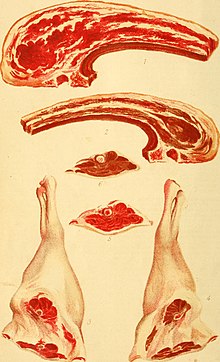Primal cut

A primal cut or cut of meat is a piece of meat initially separated from the carcass of an animal during butchering. Examples of primals include the round, loin, rib, and chuck for beef or the ham, loin, Boston butt, and picnic for pork.
Different countries and cultures make these cuts in different ways, and primal cuts also differ between type of carcass. The British, American and French primal cuts all differ in some respects. For example, rump steak in British and Commonwealth English is commonly called sirloin in American English. British sirloin is called porterhouse by Americans.[1] Another notable example is fatback, which in Europe is an important primal cut of pork, but in North America is regarded as trimmings to be used in sausage or rendered into lard. The primal cuts may be sold complete or cut further.
The distinct term prime cut is sometimes used to describe cuts considered to be of better quality; for example in the US Department of Agriculture meat grading systems, most use prime to indicate top quality.
US primal cuts
Beef
Beef primal cuts:[2]: 33
Major
- Round
- Loin
- Rib
- Chuck[3]
Minor
- Plate
- Brisket
- Foreshank
Veal
Veal primal cuts:[2]: 78
- Legs
- Loin
- Hotel rack
- Square cut chuck/shoulder
Pork
Pork primal cuts:[2]: 118
- Ham
- Loin
- Boston butt
- Picnic
- Belly with spare ribs
Lamb
Lamb primal cuts:[2]: 154
- Leg
- Loin
- Rack
- Chuck
National variations
See also
References
- ^ "Food and Cooking in American and British English", by Susan Stempleski, Medical Magazine, Macmillan Dictionaries, February 2004
- ^ a b c d Schneller, Thomas (2011). Meat: Identification, Fabrication, Utilization. Clifton Park, New York: Delmar, Cengage Learning. ISBN 978-1-4283-1994-3.
- ^ Also known as: chingolo (Spanish), Scotch tender, boneless chuck roll, mock tender steak, and chuck tender steak; see Milsom, Jennie; Laurie, Jane (2010), The connoisseur's guide to meat, New Holland, p. 69, ISBN 978-1-74257-053-2
External links
![]() Media related to Meat cuts at Wikimedia Commons
Media related to Meat cuts at Wikimedia Commons





